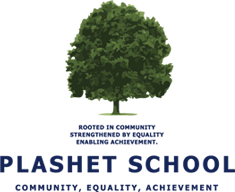How Parents/Carers Can Support Learning
At Plashet School, students are expected to develop independent learning skills that support a culture of ongoing learning. We have adopted a spiral curriculum across our school, meaning that our students will be experiencing key skills and learning content that is directly relevant to the National Curriculum or their GCSE course. We understand that GCSEs are terminal, therefore foundation understanding is constantly laid and revisited between Years 7 - 11. In school examinations therefore form part of the annual school assessment programme and as such while some home study will be directed, students should also be encouraged to organise and review their learning in all subjects on a regular basis in preparation for in school examinations.
The key to successful exam preparation is to invest in independent learning from the very beginning of the academic year. It is therefore useful to establish expectations for home study with your child from the start of each academic year. It is useful to ensure you plan a routine with your child where regular dialogue around learning at home becomes the norm. Establish a timetable for home study and set regular times when your child will engage in independent home study on a daily basis. Ensure they have quiet space in which to do this and never accept the excuse of ‘I have no homework’. Even if home study has not been directed by your child's teachers that day, your child can always spend some time organising and reviewing their prior learning in preparation for their exams.
Of course, we actively discourage cramming before exams and are clear with our students that learning should be an ongoing process. Independent study processes should include actively reviewing and recalling learning to create strong links between their short and long-term memory. Cognitive Scientists such as The Learning Scientists (found at www.learningscientists.org or as authors of the excellent book - ‘Understanding How We Learn: A Visual Guide’) insist that effective learning involves a number of key ingredients and we have tried to embrace their findings in the learning that takes place inside and outside of the classroom at Plashet School.
‘Revision’ or ‘cramming’ is the first mistake, the second is to be passive with learning. Many students think that staring is the same as learning and spend a considerable amount of time simply staring at their notes. Such activity is almost completely useless and will not help any student learn anything! Students must use active techniques if they are to see the time spent on learning used successfully.
The third mistake is to think that we are capable of multitasking. It is another myth that is not founded in any scientific research. Students must focus on one thing and one thing only. We would advise mobile devices and multimedia distractions are removed when your daughter is studying. As a parent you would be well advised to check in on this ensuring that study is time is not being hijacked by any form of digital media.
Being realistic and setting boundaries around independent home study right from the start of Year 7 will reap benefits when your child is studying for their GCSEs. Therefore, ensure she has a realistic schedule of study to support her through her academic year. Family commitments, hobbies, reading and other relaxing pastimes must not be ignored for her study - her wellbeing is paramount but taking this approach to independent home study will mean that there are no late nights or last minute panics during periods of assessments and examinations. Once designated times have been allocated, your daughter should draw up a list of the key topics that will be studied in the year. As she studies each topic/module, they can be added to her schedule for learning.
The Learning Scientists suggest six principles to adopt and their explanation of each can be found here:
For all our students, getting into the habit of active learning will help maximise exam potential and ensure another generation of young women at Plashet revel in exam success in the future.
In the autumn term of 2024, we ran sessions on 'How to support your child' for Maths, Science and English. Presentations and key links have been uploaded for each conference.
How to support your child in Maths
how to support your child in maths 2024 25.pdf
How to support your child in Science
how to support your daughter in science.pdf
How to support your child in English
how to support your daughter in english.pdf
How to support your child to stay safe online
digital resilience how to support your child to stay safe online.pdf
